Resume
Legal Aid Attorney Cover Letter Examples

May 29, 2025
|
12 min read
Unearth winning strategies for your Legal Aid Attorney cover letter, where you can learn to 'set the bar' in showcasing your skills and dedication, helping you make an impression that rules in the competitive legal field.
4.70 Average rating
Rated by 348 people
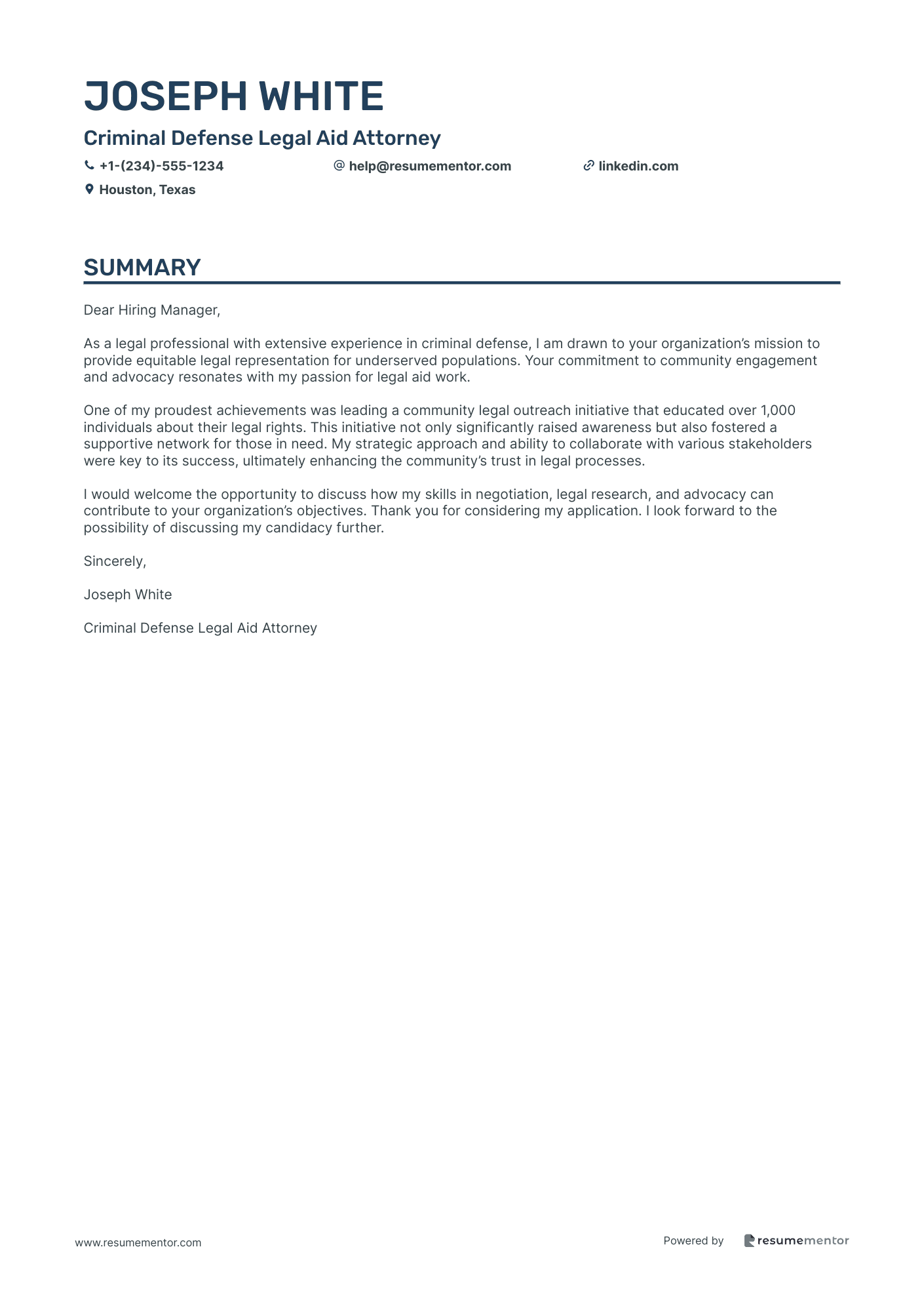
Criminal Defense Legal Aid Attorney
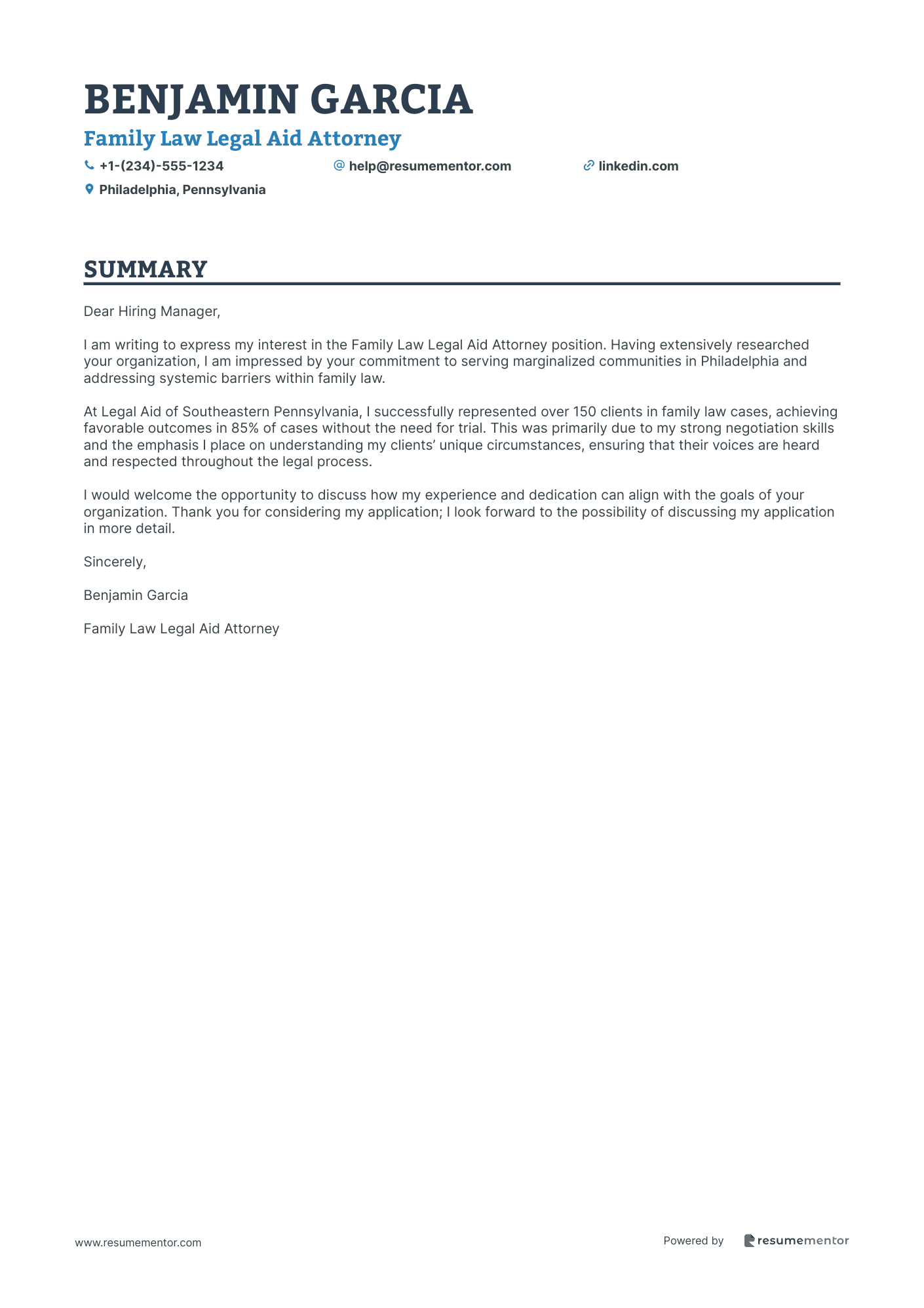
Family Law Legal Aid Attorney
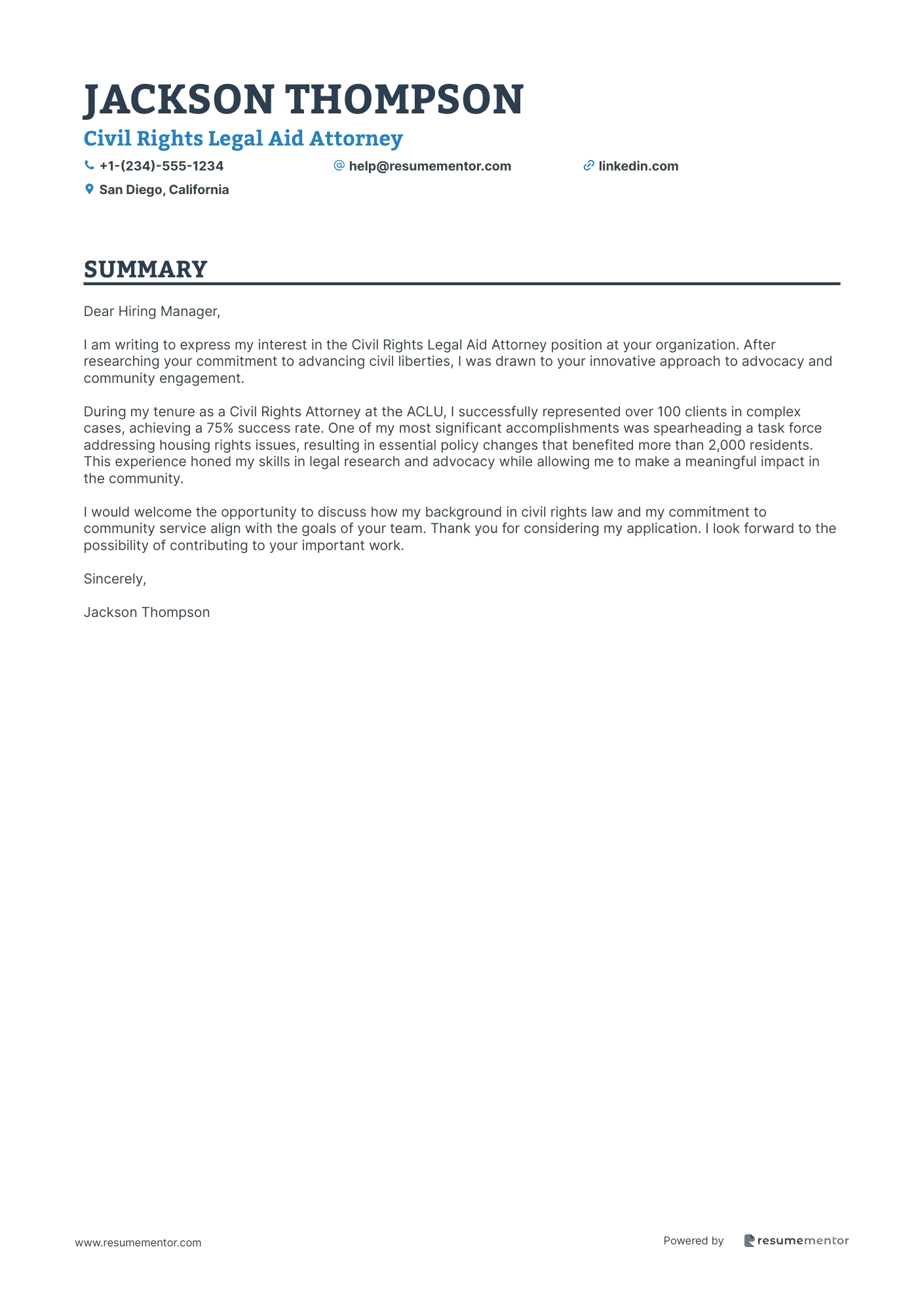
Civil Rights Legal Aid Attorney
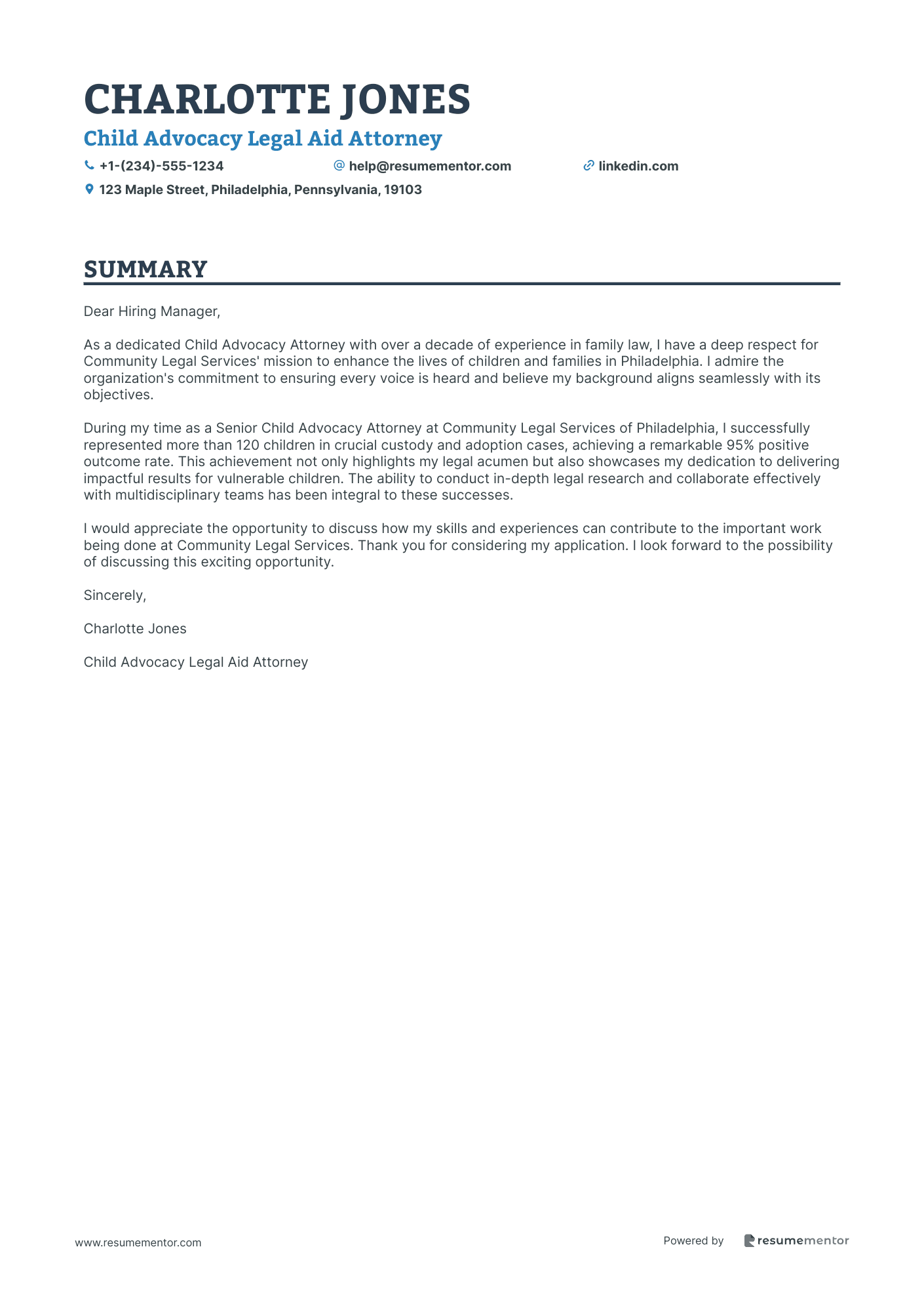
Child Advocacy Legal Aid Attorney
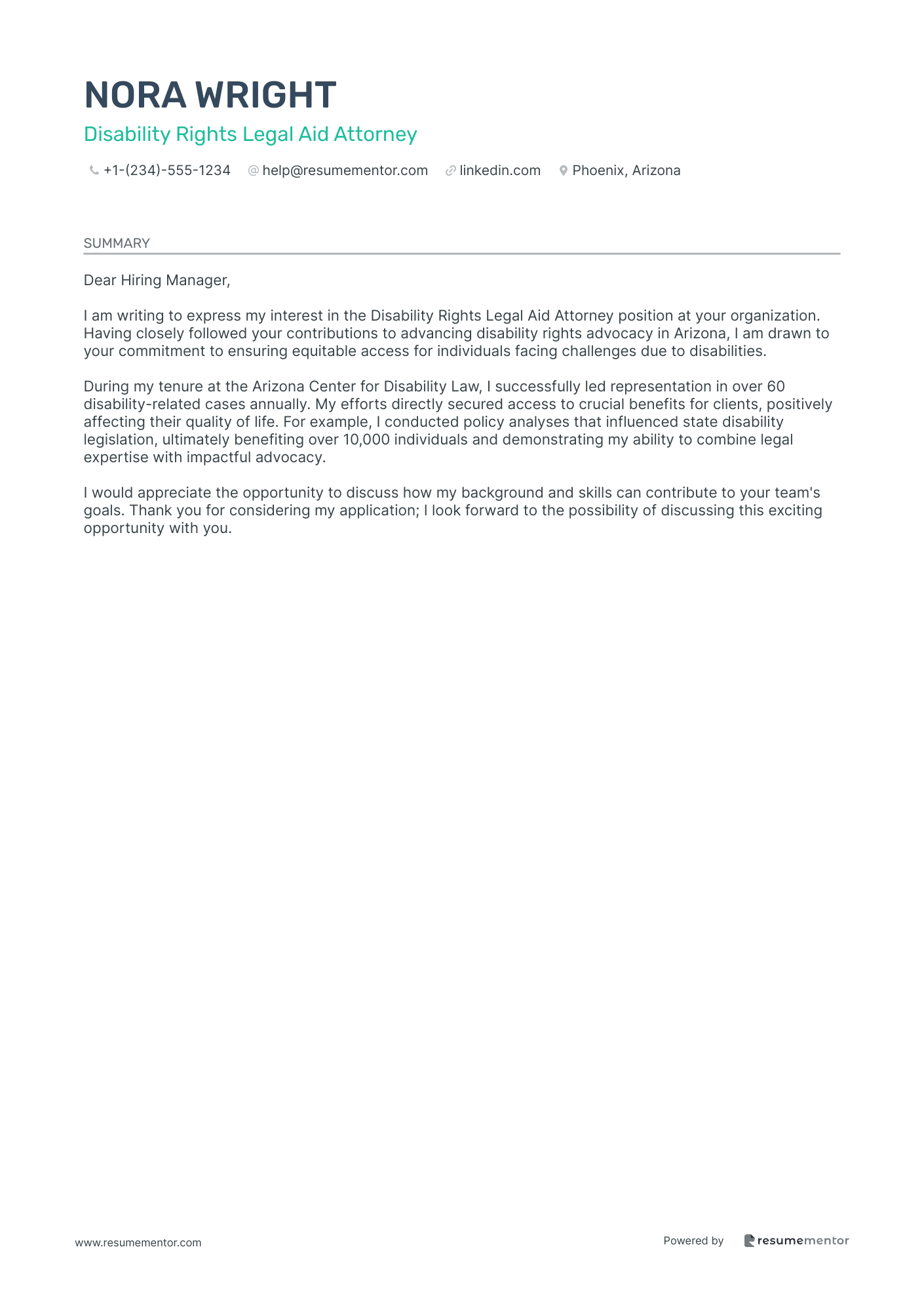
Disability Rights Legal Aid Attorney
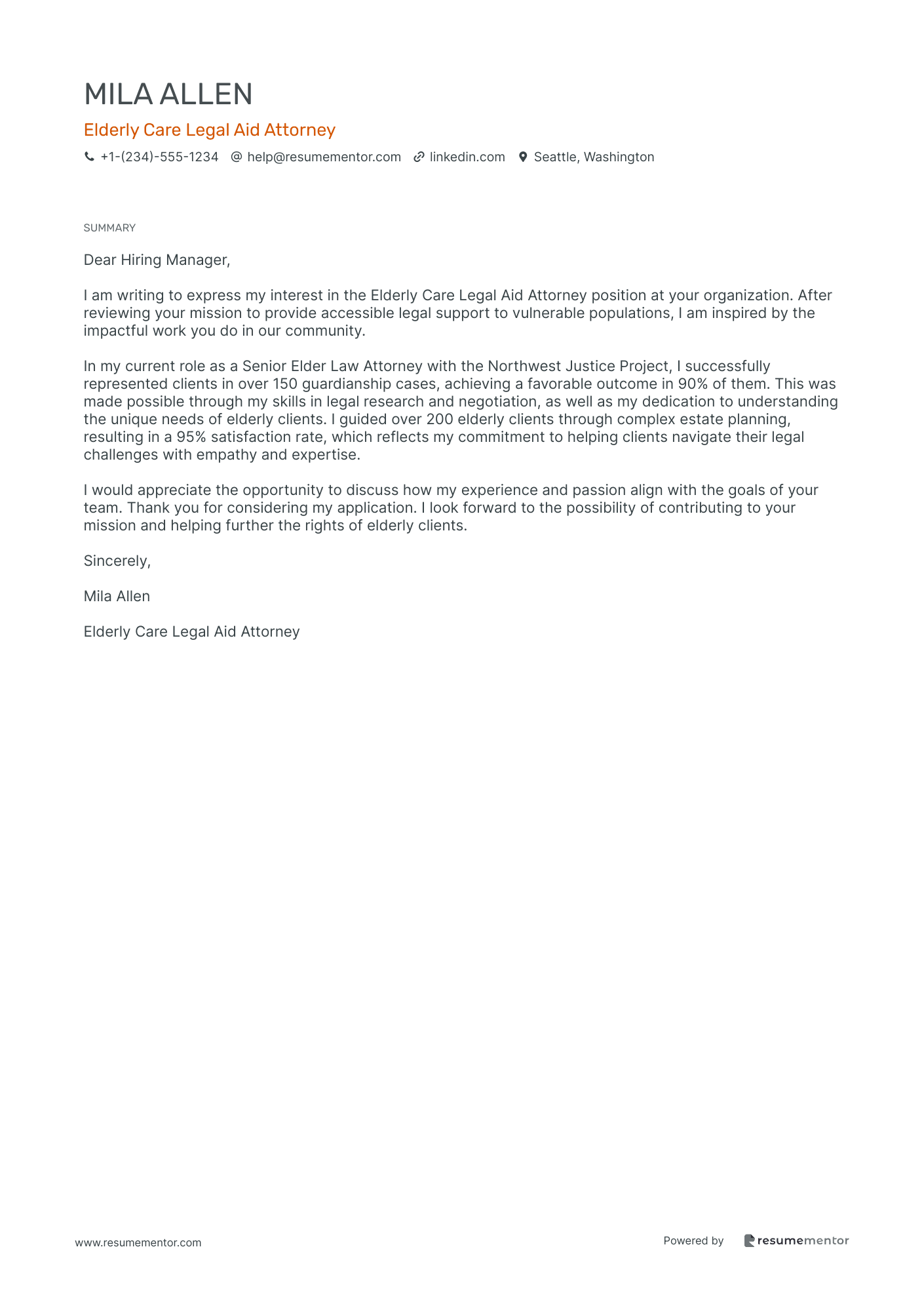
Elderly Care Legal Aid Attorney
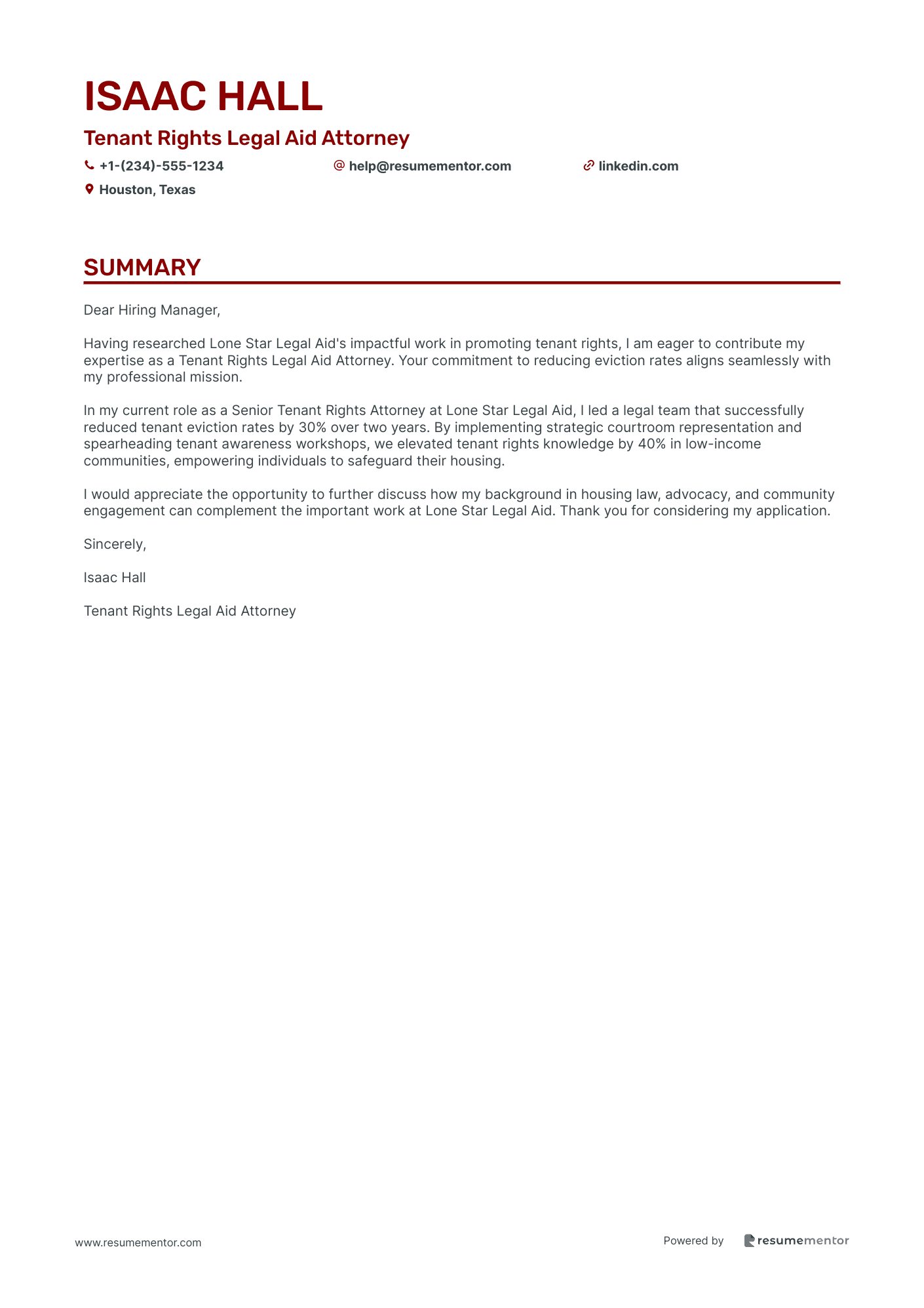
Tenant Rights Legal Aid Attorney
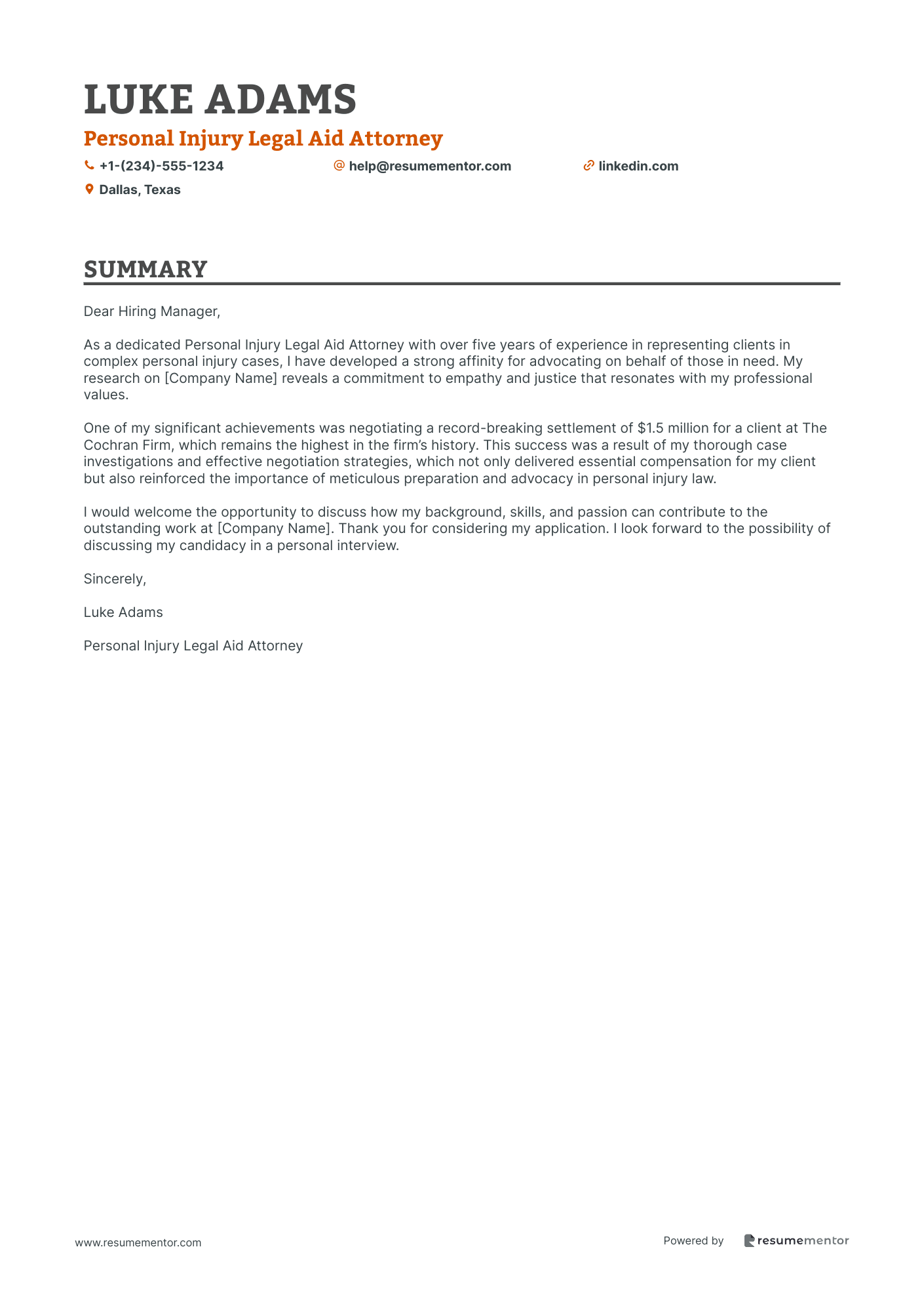
Personal Injury Legal Aid Attorney
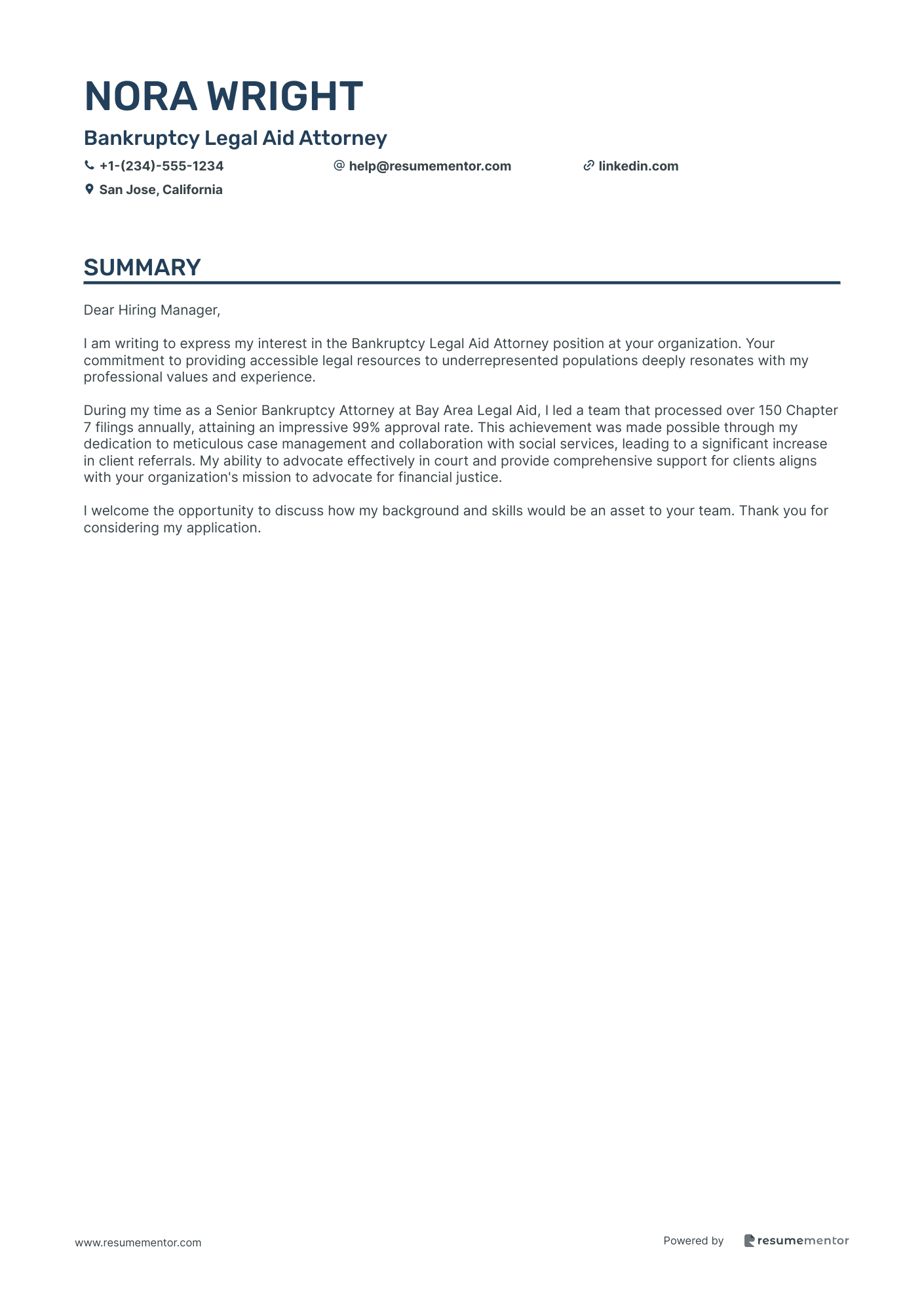
Bankruptcy Legal Aid Attorney
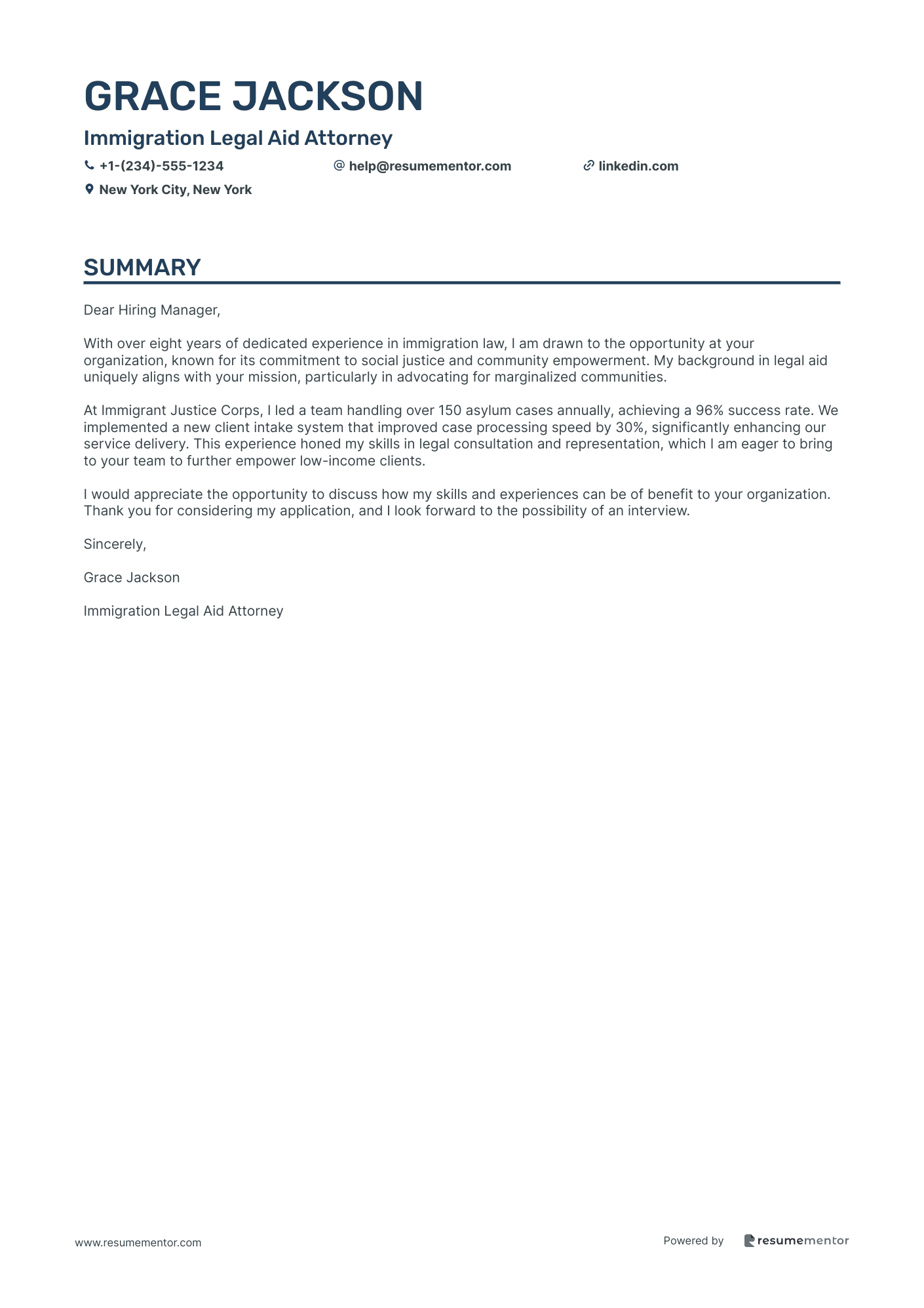
Immigration Legal Aid Attorney

Criminal Defense Legal Aid Attorney cover letter sample
When crafting your cover letter, it’s essential to emphasize any experience in criminal law or civil rights advocacy. Highlight your understanding of legal principles and procedures relevant to defense work. If you have participated in legal clinics or provided pro bono services, mention these to showcase your commitment to justice. Additionally, include your skills in client communication and negotiation, demonstrating how these have positively impacted case outcomes. Providing specific examples of successful case strategies or resolutions can strengthen your application and illustrate your ability to make a difference.
Joseph White
Criminal Defense Legal Aid Attorney
Summary
Dear Hiring Manager,
As a legal professional with extensive experience in criminal defense, I am drawn to your organization’s mission to provide equitable legal representation for underserved populations. Your commitment to community engagement and advocacy resonates with my passion for legal aid work.
One of my proudest achievements was leading a community legal outreach initiative that educated over 1,000 individuals about their legal rights. This initiative not only significantly raised awareness but also fostered a supportive network for those in need. My strategic approach and ability to collaborate with various stakeholders were key to its success, ultimately enhancing the community’s trust in legal processes.
I would welcome the opportunity to discuss how my skills in negotiation, legal research, and advocacy can contribute to your organization’s objectives. Thank you for considering my application. I look forward to the possibility of discussing my candidacy further.
Sincerely,
Joseph White
Criminal Defense Legal Aid Attorney
Family Law Legal Aid Attorney cover letter sample
In your cover letter, emphasize your experience in family law, particularly in handling cases such as custody disputes or divorce proceedings. Highlight any relevant certifications, like mediation training or coursework in family dynamics, to showcase your expertise. Detail your skills in legal research and writing, as strong documentation is key in these cases. Use specific examples of how your advocacy has positively impacted clients’ lives, focusing on the results achieved. This approach will illustrate your commitment to client welfare and your effectiveness in achieving favorable outcomes.
Benjamin Garcia
Family Law Legal Aid Attorney
Summary
Dear Hiring Manager,
I am writing to express my interest in the Family Law Legal Aid Attorney position. Having extensively researched your organization, I am impressed by your commitment to serving marginalized communities in Philadelphia and addressing systemic barriers within family law.
At Legal Aid of Southeastern Pennsylvania, I successfully represented over 150 clients in family law cases, achieving favorable outcomes in 85% of cases without the need for trial. This was primarily due to my strong negotiation skills and the emphasis I place on understanding my clients’ unique circumstances, ensuring that their voices are heard and respected throughout the legal process.
I would welcome the opportunity to discuss how my experience and dedication can align with the goals of your organization. Thank you for considering my application; I look forward to the possibility of discussing my application in more detail.
Sincerely,
Benjamin Garcia
Family Law Legal Aid Attorney
Civil Rights Legal Aid Attorney cover letter sample
When applying for this role, highlight any experience in civil rights, social justice, or advocacy work. Strong research, writing, and oral advocacy skills are essential. Discuss any internships or volunteer work where you defended clients' rights or contributed to community outreach. Mention any relevant coursework or certifications in civil liberties or legal aid. Use specific examples to illustrate how you've made a difference, employing a 'skill-action-result' format to emphasize your ability to impact cases positively and support marginalized communities.
Jackson Thompson
Civil Rights Legal Aid Attorney
Summary
Dear Hiring Manager,
I am writing to express my interest in the Civil Rights Legal Aid Attorney position at your organization. After researching your commitment to advancing civil liberties, I was drawn to your innovative approach to advocacy and community engagement.
During my tenure as a Civil Rights Attorney at the ACLU, I successfully represented over 100 clients in complex cases, achieving a 75% success rate. One of my most significant accomplishments was spearheading a task force addressing housing rights issues, resulting in essential policy changes that benefited more than 2,000 residents. This experience honed my skills in legal research and advocacy while allowing me to make a meaningful impact in the community.
I would welcome the opportunity to discuss how my background in civil rights law and my commitment to community service align with the goals of your team. Thank you for considering my application. I look forward to the possibility of contributing to your important work.
Sincerely,
Jackson Thompson
Child Advocacy Legal Aid Attorney cover letter sample
When applying for this role, it’s important to showcase any experience working with children or families, particularly in legal settings. Highlight your understanding of child welfare laws and any relevant internships or volunteer work. Mention any certifications, such as child advocacy or family law courses, to demonstrate your commitment. Use specific examples of how your legal skills have positively impacted children’s lives or families you’ve worked with, following a 'skill-action-result' format to clearly illustrate your effectiveness and alignment with the role’s mission.
Charlotte Jones
Child Advocacy Legal Aid Attorney
+1-(234)-555-1234
help@resumementor.com
123 Maple Street, Philadelphia, Pennsylvania, 19103
Summary
Dear Hiring Manager,
As a dedicated Child Advocacy Attorney with over a decade of experience in family law, I have a deep respect for Community Legal Services' mission to enhance the lives of children and families in Philadelphia. I admire the organization's commitment to ensuring every voice is heard and believe my background aligns seamlessly with its objectives.
During my time as a Senior Child Advocacy Attorney at Community Legal Services of Philadelphia, I successfully represented more than 120 children in crucial custody and adoption cases, achieving a remarkable 95% positive outcome rate. This achievement not only highlights my legal acumen but also showcases my dedication to delivering impactful results for vulnerable children. The ability to conduct in-depth legal research and collaborate effectively with multidisciplinary teams has been integral to these successes.
I would appreciate the opportunity to discuss how my skills and experiences can contribute to the important work being done at Community Legal Services. Thank you for considering my application. I look forward to the possibility of discussing this exciting opportunity.
Sincerely,
Charlotte Jones
Child Advocacy Legal Aid Attorney
Disability Rights Legal Aid Attorney cover letter sample
Highlight any previous experience in legal aid or advocacy work, particularly related to disability rights. Showcase your understanding of relevant laws, such as the Americans with Disabilities Act. It’s important to emphasize strong interpersonal skills, as you will often work with vulnerable populations. If you have participated in workshops or obtained certifications in disability law or social justice, include these details to illustrate your commitment. Use specific outcomes from past cases where your efforts led to positive results for clients, following a clear 'skill-action-result' format.
Nora Wright
Disability Rights Legal Aid Attorney
Summary
Dear Hiring Manager,
I am writing to express my interest in the Disability Rights Legal Aid Attorney position at your organization. Having closely followed your contributions to advancing disability rights advocacy in Arizona, I am drawn to your commitment to ensuring equitable access for individuals facing challenges due to disabilities.
During my tenure at the Arizona Center for Disability Law, I successfully led representation in over 60 disability-related cases annually. My efforts directly secured access to crucial benefits for clients, positively affecting their quality of life. For example, I conducted policy analyses that influenced state disability legislation, ultimately benefiting over 10,000 individuals and demonstrating my ability to combine legal expertise with impactful advocacy.
I would appreciate the opportunity to discuss how my background and skills can contribute to your team's goals. Thank you for considering my application; I look forward to the possibility of discussing this exciting opportunity with you.
Elderly Care Legal Aid Attorney cover letter sample
When creating your cover letter, emphasize your experience with legal issues affecting the elderly, such as guardianship or estate planning. Highlight any specific training in elder law and certification in relevant areas, which can demonstrate your expertise. Discuss your ability to work compassionately with clients and their families, showcasing how you've navigated sensitive situations. Include examples where your advocacy has led to positive outcomes, focusing on a 'skill-action-result' framework to illustrate your contributions and commitment to improving clients’ quality of life.
Mila Allen
Elderly Care Legal Aid Attorney
Summary
Dear Hiring Manager,
I am writing to express my interest in the Elderly Care Legal Aid Attorney position at your organization. After reviewing your mission to provide accessible legal support to vulnerable populations, I am inspired by the impactful work you do in our community.
In my current role as a Senior Elder Law Attorney with the Northwest Justice Project, I successfully represented clients in over 150 guardianship cases, achieving a favorable outcome in 90% of them. This was made possible through my skills in legal research and negotiation, as well as my dedication to understanding the unique needs of elderly clients. I guided over 200 elderly clients through complex estate planning, resulting in a 95% satisfaction rate, which reflects my commitment to helping clients navigate their legal challenges with empathy and expertise.
I would appreciate the opportunity to discuss how my experience and passion align with the goals of your team. Thank you for considering my application. I look forward to the possibility of contributing to your mission and helping further the rights of elderly clients.
Sincerely,
Mila Allen
Elderly Care Legal Aid Attorney
Tenant Rights Legal Aid Attorney cover letter sample
When crafting your cover letter, it's important to highlight any prior experience with housing law or tenant advocacy. Stress your understanding of legal procedures and rights concerning residential leases. Also, mention any courses or certifications related to housing rights, dispute resolution, or legal ethics. Provide concrete examples of how your legal skills have made a difference in clients’ lives, using a 'skill-action-result' format. This will demonstrate your ability to navigate complex situations and advocate effectively for tenants’ rights.
Isaac Hall
Tenant Rights Legal Aid Attorney
Summary
Dear Hiring Manager,
Having researched Lone Star Legal Aid's impactful work in promoting tenant rights, I am eager to contribute my expertise as a Tenant Rights Legal Aid Attorney. Your commitment to reducing eviction rates aligns seamlessly with my professional mission.
In my current role as a Senior Tenant Rights Attorney at Lone Star Legal Aid, I led a legal team that successfully reduced tenant eviction rates by 30% over two years. By implementing strategic courtroom representation and spearheading tenant awareness workshops, we elevated tenant rights knowledge by 40% in low-income communities, empowering individuals to safeguard their housing.
I would appreciate the opportunity to further discuss how my background in housing law, advocacy, and community engagement can complement the important work at Lone Star Legal Aid. Thank you for considering my application.
Sincerely,
Isaac Hall
Tenant Rights Legal Aid Attorney
Personal Injury Legal Aid Attorney cover letter sample
When crafting your cover letter, focus on your experience with personal injury cases. Emphasize any successful settlements or verdicts you've obtained for clients. Highlight your understanding of relevant laws and regulations, such as tort law or negligence standards. If you've participated in mediation or trial preparation, include these details to show your capability. Share examples of how you have helped clients navigate complex legal processes, using a clear 'skill-action-result' format to illustrate the positive outcomes of your efforts.
Luke Adams
Personal Injury Legal Aid Attorney
Summary
Dear Hiring Manager,
As a dedicated Personal Injury Legal Aid Attorney with over five years of experience in representing clients in complex personal injury cases, I have developed a strong affinity for advocating on behalf of those in need. My research on [Company Name] reveals a commitment to empathy and justice that resonates with my professional values.
One of my significant achievements was negotiating a record-breaking settlement of $1.5 million for a client at The Cochran Firm, which remains the highest in the firm’s history. This success was a result of my thorough case investigations and effective negotiation strategies, which not only delivered essential compensation for my client but also reinforced the importance of meticulous preparation and advocacy in personal injury law.
I would welcome the opportunity to discuss how my background, skills, and passion can contribute to the outstanding work at [Company Name]. Thank you for considering my application. I look forward to the possibility of discussing my candidacy in a personal interview.
Sincerely,
Luke Adams
Personal Injury Legal Aid Attorney
Bankruptcy Legal Aid Attorney cover letter sample
When crafting your cover letter, emphasize any previous experience in legal assistance or client advocacy. Highlight your understanding of bankruptcy laws and procedures, as well as any practical experience you have gained through internships or volunteer work. Stress your strong analytical and critical thinking skills, particularly in case assessments and legal research. Provide specific examples of past cases where your guidance led to successful outcomes for clients. Show your commitment to helping individuals navigate financial difficulties with empathy and professionalism, demonstrating the positive impact of your work.
Nora Wright
Bankruptcy Legal Aid Attorney
Summary
Dear Hiring Manager,
I am writing to express my interest in the Bankruptcy Legal Aid Attorney position at your organization. Your commitment to providing accessible legal resources to underrepresented populations deeply resonates with my professional values and experience.
During my time as a Senior Bankruptcy Attorney at Bay Area Legal Aid, I led a team that processed over 150 Chapter 7 filings annually, attaining an impressive 99% approval rate. This achievement was made possible through my dedication to meticulous case management and collaboration with social services, leading to a significant increase in client referrals. My ability to advocate effectively in court and provide comprehensive support for clients aligns with your organization's mission to advocate for financial justice.
I welcome the opportunity to discuss how my background and skills would be an asset to your team. Thank you for considering my application.
Immigration Legal Aid Attorney cover letter sample
It’s essential to highlight your experience in immigration law and any relevant internships or volunteer work. Emphasize your understanding of immigration processes, including visa applications, residency issues, and asylum cases. Mention any certifications or training related to immigration law, showcasing your commitment to this field. Use specific examples of cases you’ve worked on, detailing how your advocacy benefited clients. Outline your ability to communicate complex legal concepts clearly to clients and your collaboration with community organizations to strengthen support networks.
Grace Jackson
Immigration Legal Aid Attorney
Summary
Dear Hiring Manager,
With over eight years of dedicated experience in immigration law, I am drawn to the opportunity at your organization, known for its commitment to social justice and community empowerment. My background in legal aid uniquely aligns with your mission, particularly in advocating for marginalized communities.
At Immigrant Justice Corps, I led a team handling over 150 asylum cases annually, achieving a 96% success rate. We implemented a new client intake system that improved case processing speed by 30%, significantly enhancing our service delivery. This experience honed my skills in legal consultation and representation, which I am eager to bring to your team to further empower low-income clients.
I would appreciate the opportunity to discuss how my skills and experiences can be of benefit to your organization. Thank you for considering my application, and I look forward to the possibility of an interview.
Sincerely,
Grace Jackson
Immigration Legal Aid Attorney
Related Articles

Continue Reading
Check more recommended readings to get the job of your dreams.
Resume
Resources
Tools
© 2026. All rights reserved.
Made with love by people who care.
